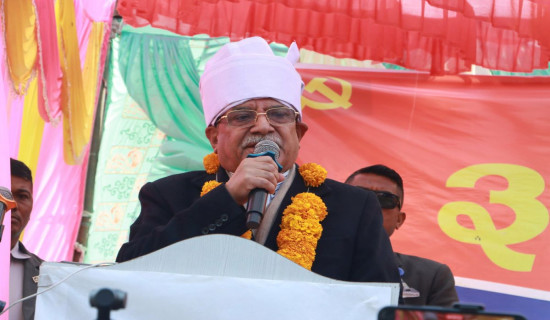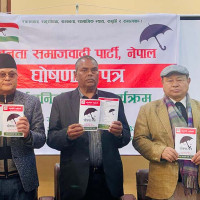- Saturday, 14 February 2026
Environmental Amnesia Threatens All
Have you ever wondered what Kathmandu looked like 50 years ago? What was the colour of the Bagmati River that flows asphalt black today? What species of birds nest in and around your home, or what varieties of butterflies fluttered on your veranda?
Well! It is a daunting task to recall our fond memories of nature because we become forgetful daily. The memory of younger us playing in the green meadows, weaving a tiara out of Seto Behuli, and drinking the sweet nectar from the Ghanti Ful is fading away. Today's generation is experiencing amnesia, slowly forgetting how nature has changed around us. The pristine quality of nature, which is supposed to be a standard, is being replaced by polluted and greyish hues deemed normal today.
Each generation's perception of what is normal is shaped by their own experience rather than an objective standard. Our generation's experience of the environment differs from what our parents or grandparents lived in and experienced. Poush Magh Ko Mutu Kapne Jado is slowly turning lukewarm today. Amid rising temperatures, a sudden plummet may give us déjà vu as if cold days were once upon a time.
Kapas Ko Batti Chorne Maina Chhari has gone incognito, which is not a green signal. We perceive the present condition of the environment to be normal without ever realising the full extent of environmental degradation that has occurred over time. This phenomenon is called 'environmental generational amnesia', propounded by psychologist Peter Kahn. And this amnesia is slowly taking its toll on biodiversity and human sustenance.
Once in a while, you must have hummed to Ram Krishna Dhakal's famous song "Bihana Uthne Bittikai Himal Dekhna Paiyos". Every time you listen to this beautiful eulogy to Mother Nature, your eyes get teary, brimming with love and admiration. Just one sight of the sun-kissed glistening mountains melts the coldest of hearts.
But what if I tell you once a snow-covered Machapuchhre turns pitch black? Mountains once adorned with heaps of snow are praying for their first snowfall. It is a stark reminder of climate change.
Environmental Generation Amnesia reminds us how we slowly lose Mother Nature to human greed. How will there be no panacea to this dire problem if no global intervention is hastened?
In every nook and corner, the climate crisis is trending as the talk of the town. Rather than deriding our anthropogenic policies and questioning our luxury-driven, pro-pollution lifestyles, we have strategically succeeded in shifting the burden of destruction onto Mother Nature. Bhagya Laharama Lahari Lahari Puge Ma Yas Marusthalma Kasari will come to fruition if silence becomes the norm.
For instance, Executive Order No. 14162 passed by President Donald Trump, "Putting America First in International Environmental Agreements", will severely impede any progressions made by the Paris Agreement thus far in mitigating the climate crisis. This lack of urgency shown by big power nations is enervating the modicum of initiatives a few developed and developing countries commenced.
Vandalising forests and mountains in the name of development and enacting policies to favour commercialisation over the environment are popular games played in today's time. Better do they know this will cost us an arm and a leg to prevent destruction and get it all right again? Each reckless action of ours is taking us one step closer to being environmentally amnesic, distancing people away from nature.
Sagarmatha Sambaad, hailed as essential diplomacy for Nepal, is doomed to be inconsequential if the big-power nation stops making the right environmental decisions. As the fading snow in the mountains states, complacency will further exacerbate inter- and intra-generational ecological responsibilities.
On the brighter side, the Nepali adage Hariyo Ban Nepalko Dhan has regained momentum as forest coverage has burgeoned to 45.31 per cent. This feat is achieved due to the incessant effort of the government and community forest user groups. This is a harbinger of hope and a message to nations lost in their anthropogenic conflicts: "Walk the talk and not talk the talk."
Oscar Wilde rightly phrased, "Winter comes with wisdom." Some nations have started buckling their sustainable game by predicting the catastrophe if profit precedes Mother Nature. To tackle environmental amnesia, communities in parts of Asia have commenced 'connecting to your roots' projects primarily focused on sustainability and that are eco-friendly.
Mayor Harka Sampang Rai of Dharan Municipality has pledged to plant 10 million trees with the volunteerism of the Dharan locals. Mayor Balen Shah of Kathmandu Metropolis is moving heaven and earth to protect the "right of way" of rivers, resurrecting ancient Hitis, and excavating ponds to tackle cultural amnesia.
Technologically advanced countries have upped their green investments and are prepping robust environmental policies. Green labs, mini-grid programmes, programmable thermostats, vertical farming, and wave energy are the flagship projects gaining impetus. But these are just minuscule efforts compared to the monstrosity of the problem. These efforts must be made on a continuum to tackle amnesia and heal the wounded relationship between humans and the Earth.
Unfettered industrial growth and a lack of corporate environmental responsibility and accountability for ecological destruction fuel generational amnesia about nature. Small changes pose no threat to this amnesia.
(The author is an incumbent section officer at the supreme court of Nepal.)















